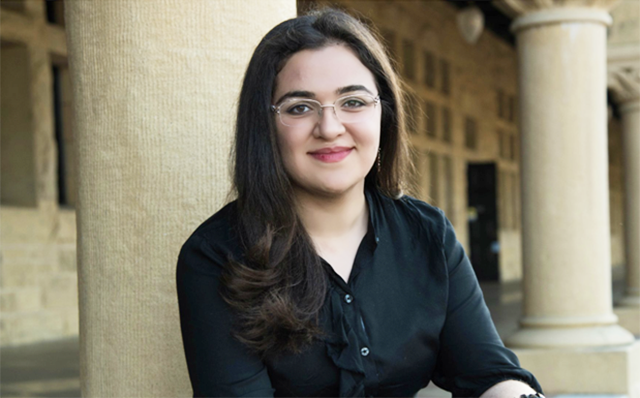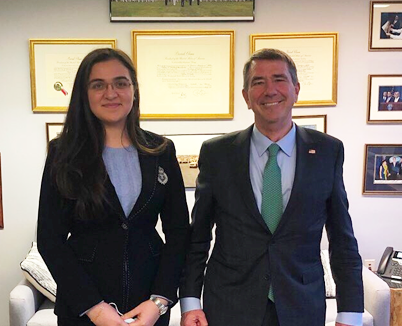-

Hear from Professor Monica Toft
Learn how Professor Monica Toft is shaping the study of global affairs and diplomacy at Fletcher.
Hear from Prof. Toft -

Explore Fletcher academics in action
Fletcher Features offers insights, innovation, stories and expertise by scholars.
Get global insights -
Get application tips right from the source
Learn tips, tricks, and behind-the-scenes insights on applying to Fletcher from our admissions counselors.
Hear from Admissions -

Research that the world is talking about
Stay up to date on the latest research, innovation, and thought leadership from our newsroom.
Stay informed -
Meet Fletcherites and their stories
Get to know our vibrant community through news stories highlighting faculty, students, and alumni.
Meet Fletcherites -

Forge your future after Fletcher
Watch to see how Fletcher prepares global thinkers for success across industries.
See the impact -

Global insights and expertise, on demand.
Need a global affairs expert for a timely and insightful take? Fletcher faculty are available for media inquiries.
Get in Touch
Fletcher Alumna Spotlight:
Mariam Amini, CSPP’22

We’ve all been there: we’re rushing to make a deadline, be it for work, school, or a personal project, and suddenly the internet stops working.
Once the internet is back, the hiccup becomes a thing of the past. However, some are left wondering ‘Why did we lose internet connection? Was it on purpose…? Who is responsible?’
These were the questions Mariam Amini (‘22) asked when she lost internet connection while working at CNBC. Amini recalls it was an early November morning in 2016 when her editor asked her to quickly write a paragraph to break the news of the TimeWarner and AT&T merger. “It was to be one of the biggest merger stories of the decade” Amini recalls, a significant story for a young reporter to write.
Internet connection returned to the newsroom after about an hour or so, but it was too late for Amini to be the first to break the big telecommunications news. All of the COMCAST networks had lost connection -- including NBC, MSNBC, Telemundo, and even other news agencies like the Wall Street Journal and New York Times. Amini remembers this incident clearly because it was a few days after the 2016 Presidential Election. “Imagine if newsrooms were taken off the grid on Election Day,” Amini said with concern. It was later revealed that a number of news organizations were the target of a DDOS attack.
“DDoS is a distributed denial-of-service attack and it is designed to stop internet traffic from coming in,” Amini explains, “I did not know what this term meant at the time.” But it was the curiosity to know what such cyber attacks meant that changed the trajectory of Amini’s career.
Amini is part of the inaugural class on the Cybersecurity and Public Policy (CSPP) dual degree at the Fletcher School of Law and Diplomacy and Tufts School of Engineering. “There is no degree program like this,” claims Amini, who before pursuing cybersecurity policy was considering joint JD/MBA programs. The CSPP Master of Science program embraces an interdisciplinary approach, giving students many avenues to become cybersecurity policy experts.
The curriculum requires students to take a series of engineering courses to fulfill core cybersecurity requirements. “I don’t come from a strong technical background,” said Amini, who double majored in History and Spanish at Stanford University, “I overcame a learning curve by first learning the basics and working my way up in courses like How Systems Work and How Systems Fail.”
Before coming to Tufts University, Amini held communications roles at Stanford Law School, Human Rights Watch, CNBC, White House, and the Department of Defense. Most recently, she was the Deputy Media Monitor for the Mike Bloomberg 2020 Presidential Campaign.
It was while interning in the Office of Secretary of Defense Ashton Carter in 2015 that Amini first heard of cybersecurity. Amini recalls Secretary Carter’s Drell Lecture where he laid out the future dilemmas of the cyber domain. “It was all a new terminology to me and I went along with it without really understanding the nuances of what makes the cyber domain.”
Mariam Amini with former Secretary of Defense Ashton Carter in December 2021.
Fast forward to 2021. As a Tufts CSPP student, Amini enrolled in a technology course taught by Secretary Carter at Harvard Kennedy School. She attended a few office hours to discuss U.S. cyber policy and its impact on geopolitics. Amini also joined the Defense Innovation Unit -- an initiative Secretary Carter launched when they were working at the Pentagon.
“The CSPP program has given me more confidence to dive deeper into cybersecurity and be more knowledgeable to ask the right questions from experts,” said Amini. She believes it has worked in her favor to be a tech outsider before pursuing a graduate engineering degree.
Drawing on her experience reporting on the war in Libya and Afghanistan, Amini’s research projects for Professor Josephine Wolff’s famous Privacy in Digital Age course were on misinformation campaigns and communications security.
Outside of the classroom, Amini continued her research on election misinformation for the Fletcher School’s Institute of Business in the Global Context as a Graduate Research Analyst. Her team published their findings on 2020 election misinformation, specifically looking at the swing states that Amini was tracking when she was with the Bloomberg presidential campaign.
In March, Amini presented her research on Afghanistan to the Google Privacy Engineers after a Fletcher alum working at Google learned about her work and invited her to brief Google. “It really is true, the Fletcher Mafia stays connected and as CSPP students, we are also part of Tufts Engineering alumni,” added Amini.
Before graduating, Amini landed a senior position at a cybersecurity consulting firm. “I am working on similar internet infrastructure problems that brought me to study cybersecurity. It is surreal. I look back, and I cannot believe I am where I am,” Amini shared.
Amini believes her unconventional career path has helped her reach across the aisle and be able to translate technical language to fit into policymaking. “We need more people like me in cybersecurity,” Amini says, “I am a cybersecurity expert who thinks like a historian and asks questions like a journalist.”
While Amini is referring to her unique background, there is a significant shortage of women in cybersecurity. Fifty-two percent of women hold an advanced cybersecurity degree like Amini, according to the International Information System Security Certification Consortium (ISC)². In comparison, only 24 percent of the cybersecurity workforce is women.
Before leaving the Fletcher School, Amini met with Fletcher School’s Dean Rachel Kyte and the Founder and Director of the CSPP degree program, Professor Susan Landau, to discuss starting a scholarship for women studying cybersecurity. “One way to bridge this gender gap is to make it financially easier for women to study cybersecurity,” said Amini, who herself is the 2021-2022 recipient of the Scholarship for Women Studying Information Security awarded by the Applied Computer Security Associates.
“Cybersecurity is too important not to have equal women representation,” said Amini.
You can follow Mariam on Twitter @mariamamini and on LinkedIn.


